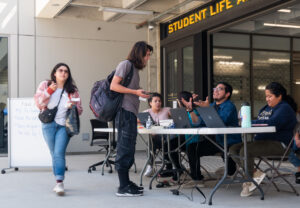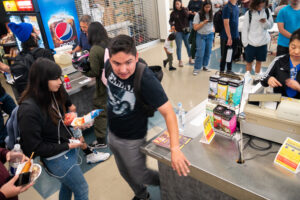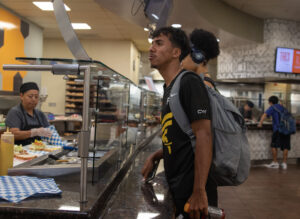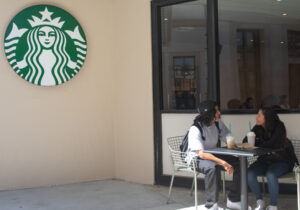STORY BY GABI GARCIA, CO-EDITOR-IN-CHIEF
PHOTOS BY DAVID ENRIQUEZ AND JOCELYN PADILLA, STAFF PHOTOGRAPHERS
Cypress College’s free food program has become an issue with no proper solution in sight as longer wait times and interruption of learning are increasing among students.
On Mon. Sept. 25, Cypress College introduced the new changes to students, staff, and faculty in an email from Director of Campus Communications Marc S. Posner. The changes included students retrieving a reloadable $12 gift card with their physical student ID card every day and then proceeding to get in line for the Charger Cafe.
The new changes became one of the biggest issues on campus, students were outraged, concerned about wait times, food quality, and access to food throughout their time on campus.
Several departments including the fine arts, stem, athletics and medical are on campus until 9 or 10 P.M. Crystal Colocho, a theater major at Cypress, said that she struggles with not having two meals a day like in previous semesters. “…I can only get one or the other. I’m here until night[time], lunch ends up being my only meal.”
The wait times for food have been amongst the larger inconveniences surrounding the program on campus. This is time students do not have to spare, but making them choose between getting to class or getting what may be their only meal of the day is unacceptable.

(09/25/23) – CYPRESS COLLEGE – People line up for gift cards to use at the Cypress College Charger Cafe of Monday, September 25, 2023. (Photo by David Enriquez)
The Chronicle spoke with Posner about the push back from the email itself, “We didn’t get a lot of replies, a few thank you’s and one kind of similar to what you shared on Instagram.”
People aren’t happy, they understand that the method that was available was flawed, but are struggling to see how it can get better with the new changes. “I get the apprehension,” Posner said, “I think the big concern is people feel like they’ve already gone through the growing pains and already have it figured it out… they think ‘oh my gosh what if it’s worse?’”
The first day proved that changes did make it worse.
Vice President of Administrative Services, Stephen Schoonmaker gave information on how it went. “We hit 55 minutes around 12:30 P.M. which is unacceptable, so I am going to speak with our vendor on what we can do to make it better.” There were even several students showing up late to their classes because the line took so long.
The concern of wait times was also based on staffing, during the previous rollout of the program it was always just one person scanning student IDs. This time around two people are scanning, but that still didn’t seem to make it go any smoother.
“One person [on staff] said she was going to try two lines but she hasn’t been able to keep up, they need more cashiering.” said Schoonmaker.

(09/25/23) – CYPRESS COLLEGE – People in the Cypress College Charger Cafe getting lunch on Monday, September 25, 2023. (Photo by David Enriquez)
Professor Donny Jackson, technical theatre instructor at Cypress, said he didn’t hear much complaining from students until this semester. His students are complaining about the quality of food, wait times, and options, “I’ve heard up to 90 minutes, which they don’t have. Thirty isn’t even really fair, sometimes they have ten or fifteen minutes in between classes.”
Marty Florence, an acting major at Cypress, explained her experience with the food quality from the Charger Cafe, “The food here is abysmal, in the chicken tenders was an unknown blackish-purple substance. The meal program has been problematic for way too long now. Fix this.”
Anneliese Esparza also gave her opinion, “There [was] no point to the change other than to make it more difficult for people to get food.” Students are struggling to understand why anything changed besides finding a solution to the wait time, which didn’t call for such a dramatic shift to the program in the middle of the semester.
The access to free food on campus is beginning to impact academics. Schoonmaker acknowledged this issue, “I heard of students who waited in line for 30 minutes and gave up saying ‘I gotta get to class’ and so that doesn’t do what we’re trying to do.” There are several things that need to be addressed and will be addressed according to Schoonmaker.
Schoonmaker explained more of the different issues that the program struggled with on it’s first day, pricing being one of them, “a lot of their pricing is what you’ll see at a store but I think when students know they only have 12 dollars and they’re trying to add in their heads; if we had even numbers it might be easier for them.”
Unfortunately in pursuit of making this change for the better, prices went up instead, “I’m going to work with them to drop some of their prices, round down where they can and round up where they need to.” The effort to help ended up hurting students more.
When asked about the impact on his curriculum Jackson emphasized how his students need a meal to get through their performances and rehearsals, “They can’t do that on an empty stomach…if we have students that are starving, that’s a problem. It affects teaching because they’re distracted, they can’t focus, they need something to eat.”
It was suggested to Schoonmaker by several people to just go back to the way it was before, with only two to three options and one line. He said if that is what needs to be done then they will do that, “We are not going to settle.”
Sister-school Fullerton College, figured out the free food program last semester and has an expansive selection along with brand new facilities. They even remodeled their old cafeteria into a Starbucks staffed with student workers.

(09/26/2023) – FULLERTON – FULLERTON COLLEGE LUNCH – Aldo Ramirez, a Fullerton College business administration student, orders lunch at Buzzy’s Deli. “Fullerton College has a pretty good food program,” said Ramirez, “Getting $12 per day for breakfast or lunch really helps us students out.” Registered Fullerton College students receive a $12 credit per day that can be used at any of the food services in the Commons. Choices include Buzzy’s Deli, The Grill, Simply-to-Go, Slice of Life and Tres Habenaros. While not part of the Fullerton College $12 per day meal allotment, the campus also has a Starbucks and Jamba Juice. Photo by Jocelyn Padilla, September 26, 2023.
Posner further explained that the bigger issue for why Cypress hasn’t been able to match Fullerton is technology. “The technology hasn’t worked for us, we’re still trying to get there.”
Schoonmaker explained that the technology aspect was something they started working on months ago, “We thought by the start of fall we’d have the student ID loaded with the $12 a day, because we heard that students liked that flexibility.”
Fullerton’s ID card is reloaded every night for students with the $12. Students do not have to wait in line for an additional gift card and then in another line to get food. There are approximately three cashiers on duty all day. The ease and convenience has led students at Cypress to drive all the way to Fullerton for food.

(09/26/2023) – FULLERTON – FULLERTON COLLEGE LUNCH – Fullerton College student, Amy Garcia enjoys a beverage with a friend. “I like having a Starbucks on campus. It’s really convenient,” said Garcia. Starbucks is one of the many restaurant options that Fullerton College offers. Registered Fullerton College students receive a $12 credit per day that can be used at any of the food services in the Commons. Choices include Buzzy’s Deli, The Grill, Simply-to-Go, Slice of Life and Tres Habenaros. Photo by Jocelyn Padilla, September 26, 2023.
The Charger Food Pass program has an approximated 2 million dollar budget this semester through a state grant. This program is needed, there are 14,000 students on campus and more than half need this program. Jackson mentioned how important a program like this is for student enrollment, “to see something so basic be a way that we lose students is really scary.”
This program needs major improvements even if by the third day things seem to be getting easier. There is still little to no room for flaws when it comes to providing food for students. It’s unfair that students have to make sacrifices regarding meals and change needs to be made in order for this program to succeed. It’ll take time, but there’s not much time left and there’s only so much students can do to advocate for themselves.




